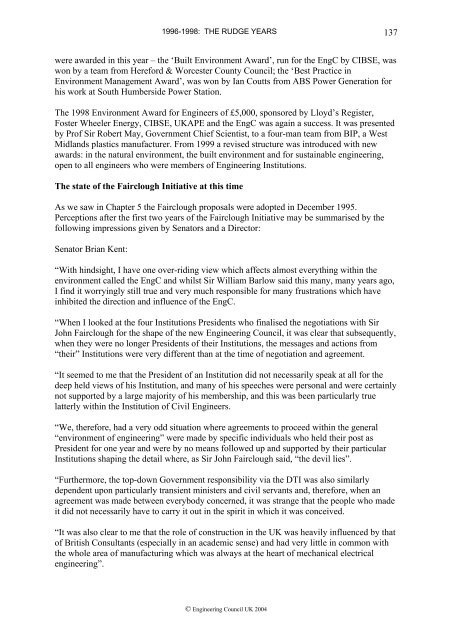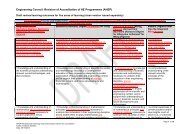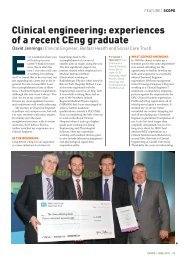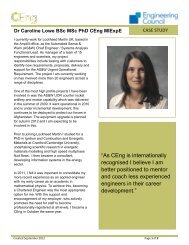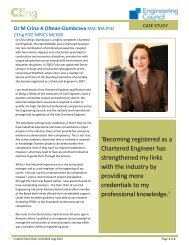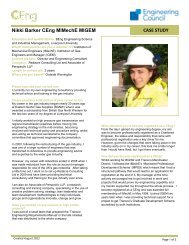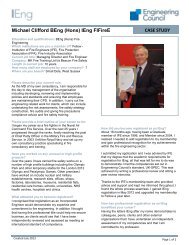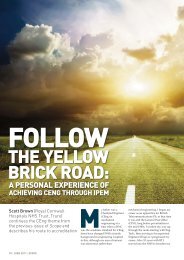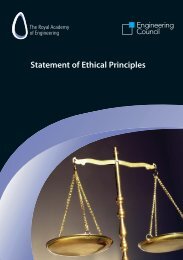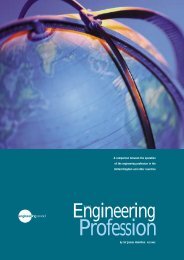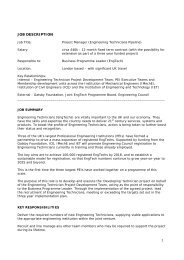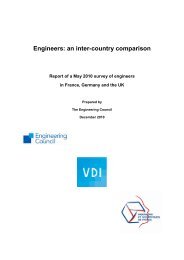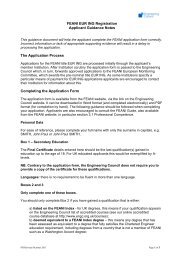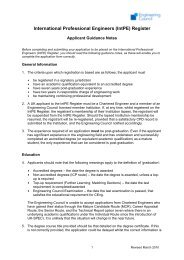An Engine for Change - A Chronicle of the Engineering Council
An Engine for Change - A Chronicle of the Engineering Council
An Engine for Change - A Chronicle of the Engineering Council
Create successful ePaper yourself
Turn your PDF publications into a flip-book with our unique Google optimized e-Paper software.
1996-1998: THE RUDGE YEARS 137were awarded in this year – <strong>the</strong> ‘Built Environment Award’, run <strong>for</strong> <strong>the</strong> EngC by CIBSE, waswon by a team from Here<strong>for</strong>d & Worcester County <strong>Council</strong>; <strong>the</strong> ‘Best Practice inEnvironment Management Award’, was won by Ian Coutts from ABS Power Generation <strong>for</strong>his work at South Humberside Power Station.The 1998 Environment Award <strong>for</strong> <strong>Engine</strong>ers <strong>of</strong> £5,000, sponsored by Lloyd’s Register,Foster Wheeler Energy, CIBSE, UKAPE and <strong>the</strong> EngC was again a success. It was presentedby Pr<strong>of</strong> Sir Robert May, Government Chief Scientist, to a four-man team from BIP, a WestMidlands plastics manufacturer. From 1999 a revised structure was introduced with newawards: in <strong>the</strong> natural environment, <strong>the</strong> built environment and <strong>for</strong> sustainable engineering,open to all engineers who were members <strong>of</strong> <strong>Engine</strong>ering Institutions.The state <strong>of</strong> <strong>the</strong> Fairclough Initiative at this timeAs we saw in Chapter 5 <strong>the</strong> Fairclough proposals were adopted in December 1995.Perceptions after <strong>the</strong> first two years <strong>of</strong> <strong>the</strong> Fairclough Initiative may be summarised by <strong>the</strong>following impressions given by Senators and a Director:Senator Brian Kent:“With hindsight, I have one over-riding view which affects almost everything within <strong>the</strong>environment called <strong>the</strong> EngC and whilst Sir William Barlow said this many, many years ago,I find it worryingly still true and very much responsible <strong>for</strong> many frustrations which haveinhibited <strong>the</strong> direction and influence <strong>of</strong> <strong>the</strong> EngC.“When I looked at <strong>the</strong> four Institutions Presidents who finalised <strong>the</strong> negotiations with SirJohn Fairclough <strong>for</strong> <strong>the</strong> shape <strong>of</strong> <strong>the</strong> new <strong>Engine</strong>ering <strong>Council</strong>, it was clear that subsequently,when <strong>the</strong>y were no longer Presidents <strong>of</strong> <strong>the</strong>ir Institutions, <strong>the</strong> messages and actions from“<strong>the</strong>ir” Institutions were very different than at <strong>the</strong> time <strong>of</strong> negotiation and agreement.“It seemed to me that <strong>the</strong> President <strong>of</strong> an Institution did not necessarily speak at all <strong>for</strong> <strong>the</strong>deep held views <strong>of</strong> his Institution, and many <strong>of</strong> his speeches were personal and were certainlynot supported by a large majority <strong>of</strong> his membership, and this was been particularly truelatterly within <strong>the</strong> Institution <strong>of</strong> Civil <strong>Engine</strong>ers.“We, <strong>the</strong>re<strong>for</strong>e, had a very odd situation where agreements to proceed within <strong>the</strong> general“environment <strong>of</strong> engineering” were made by specific individuals who held <strong>the</strong>ir post asPresident <strong>for</strong> one year and were by no means followed up and supported by <strong>the</strong>ir particularInstitutions shaping <strong>the</strong> detail where, as Sir John Fairclough said, “<strong>the</strong> devil lies”.“Fur<strong>the</strong>rmore, <strong>the</strong> top-down Government responsibility via <strong>the</strong> DTI was also similarlydependent upon particularly transient ministers and civil servants and, <strong>the</strong>re<strong>for</strong>e, when anagreement was made between everybody concerned, it was strange that <strong>the</strong> people who madeit did not necessarily have to carry it out in <strong>the</strong> spirit in which it was conceived.“It was also clear to me that <strong>the</strong> role <strong>of</strong> construction in <strong>the</strong> UK was heavily influenced by that<strong>of</strong> British Consultants (especially in an academic sense) and had very little in common with<strong>the</strong> whole area <strong>of</strong> manufacturing which was always at <strong>the</strong> heart <strong>of</strong> mechanical electricalengineering”.© <strong>Engine</strong>ering <strong>Council</strong> UK 2004


